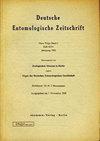The Rubens morph of Formica exsecta Nylander, 1846 and its separation from Formica fennica Seifert, 2000 (Hymenoptera, Formicidae)
IF 0.9
3区 农林科学
Q2 ENTOMOLOGY
引用次数: 4
Abstract
A study of numeric morphology-based alpha-taxonomy (NUMOBAT) considering the species Formicaexsecta Nylander, 1846 and F.fennica Seifert, 2000 was performed in 166 nest samples with 485 worker individuals originating from 117 localities of the Palaearctic west of 59°E. The presence of intraspecific pilosity dimorphism is shown for F.exsecta. The setae-reduced phenotype, termed the Rubens morph, shows a frequency of about 25%, and the more abundant setae-rich phenotype, termed the Normal morph, one of 75%. The frequency of nests containing workers of both phenotypes is 15.5% in 58 samples from Denmark, Sweden, and Finland. Applying the DIMORPH test of Seifert (2016) on this territory, it is demonstrated that the association of Rubens and Normal phenotypes within the same nest cannot be interpreted as parabiosis of independent species (p=0.017) or as temporary (p=0.0004) and permanent (p=0.0001) socially parasitic association, whereas genetically mediated intraspecific dimorphism is most likely (p=0.659, all p data according to Fisher’s exact test). The Rubens morph of F.exsecta is phenotypically most similar to F.fennica but is safely separable by four different forms of exploratory data analyses using nest centroids (NC) as input data: NC-Ward, NC-part.hclust, NC-part.kmeans, and NC-NMDS-k-means. Data on zoogeography and the narrow climate niche indicate that F.fennica is unlikely to occur in Norway.1846年农虫的Rubens形态及其与2000年农虫科农虫的分离(膜翅目,农虫科)
本文对古北59°E以西117个地点的166个巢样、485只工蚁进行了数值形态学α分类(nummobat)研究。种内毛蕊二态现象在f.e exsecta中存在。集减少表型,称为鲁本斯形态,显示出大约25%的频率,而更丰富的集丰富表型,称为正常形态,75%的频率之一。在来自丹麦、瑞典和芬兰的58个样本中,包含两种表型工蚁的巢的频率为15.5%。应用Seifert(2016)的DIMORPH测试,结果表明,同一巢内Rubens和Normal表型的关联不能被解释为独立物种的异种共生(p=0.017),也不能被解释为暂时的(p=0.0004)和永久的(p=0.0001)社会寄生关联,而遗传介导的种内二态现象最有可能(p=0.659,所有p数据均根据Fisher的精确检验)。f.f exsecta的Rubens形态在表型上与f.f fennica最相似,但可以通过四种不同形式的探索性数据分析安全地分离,使用巢质心(NC)作为输入数据:NC- ward, NC-part。hclust NC-part。和NC-NMDS-k-means。动物地理学数据和狭窄的气候生态位表明,芬尼沙鼠不太可能出现在挪威。
本文章由计算机程序翻译,如有差异,请以英文原文为准。
求助全文
约1分钟内获得全文
求助全文
来源期刊
CiteScore
1.60
自引率
0.00%
发文量
9
审稿时长
3 months
期刊介绍:
Founded in 1857 as Berliner Entomologische Zeitschrift, Deutsche Entomologische Zeitschrift is one of the World''s oldest international journals of systematic entomology. It publishes original research papers in English on the systematics, taxonomy, phylogeny, comparative morphology, and biogeography of insects. Other arthropods are also considered where of relevance to the biology of insects. The geographical scope of the journal is worldwide.
Deutsche Entomologische Zeitschrift (DEZ) is dedicated to provide an open access, high-quality forum to contribute to the documentation of insect species, their distribution, their properties, and their phylogenetic relationships. All submitted manuscripts are subject to peer-review by the leading specialists for the respective topic. The journal is published in open access high-resolution PDF, semantically enriched HTML and machine-readable XML versions.

 求助内容:
求助内容: 应助结果提醒方式:
应助结果提醒方式:


